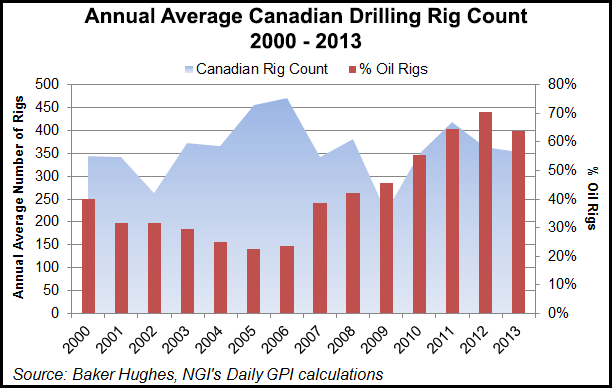E&P | LNG | NGI All News Access | Regulatory
Canadian Oil & Gas Industry Says Federal Budget Measures Key to Growing Workforce
The Canadian Association of Petroleum Producers (CAPP) said Wednesday it supports federal budget measures announced Tuesday to grow Canada’s skilled trades workforce, noting that hundreds of thousands of workers will be needed to support the country’s growing oil and natural gas sector.

CAPP said worker shortages have inflationary implications, including cost increases for construction projects and increased project execution risk, and could impact the private sector’s ability to attract investment.
According to the Petroleum HR Council of Canada, hiring needs for direct oil and gas jobs in Canada over the next decade will range between 125,000 and 150,000 jobs — both professionals and skilled trades — as a result of forecast industry activity, retirements and turnover. Canada’s Construction Sector Council estimates a need to recruit 246,000 new construction workers to meet construction sector expansion demand and to replace retiring workers between 2013 and 2021.
Canadian Minister of Finance Jim Flaherty on Tuesday unveiled Economic Action Plan 2014, which confirms that the government is on track to return to balanced budgets in 2015, with new measures that will create jobs and opportunities in an uncertain global economy.
Economic Action Plan 2014 includes:
? Launching the Canada Job Grant and an enhanced Job Matching Service to help connect Canadians with available jobs;
? Introducing a new Canada Apprentice Loan to help registered apprentices in Red Seal trades with the cost of training;
? Investing to reform the on-reserve education system, in partnership with First Nations, through the First Nations Control of First Nations Education Act;
? Investing in programs to help older workers and persons with disabilities access the labor market;
? Creating thousands of new paid internships for young Canadians entering the job market;
? Making a major investment of $500 million in automotive sector support, investments in Canada’s forestry and mining sectors, and much more; and
? Providing $1.5 billion over the next decade for the Canada First Research Excellence Fund for post-secondary research.
“Our industry is the largest employer of skilled trades workers in Canada, so we strongly support government measures to promote careers in this sector,” said Dave Collyer, CAPP president. “Meeting the labor requirements of a growing economy is crucial to the oil and gas industry, particularly in the oilsands and for plans now under consideration to build a liquefied natural gas industry in British Columbia.”
Given the number of highly skilled, well-paying jobs in the oil and gas industry, CAPP noted that skilled labor groups are among the strongest supporters of responsible oilsands development and associated pipeline transportation projects. The association works with union and nonunion labor groups on initiatives to improve labor availability, including workforce mobility, skilled trades training and apprenticeship opportunities, and immigration.
“We believe in hiring Canadians first, attracting and recruiting within Canada, and building and developing the current and future workforce,” Collyer said. “We need to attract more Canadians into the skilled trades, provide more classroom and employment-based training opportunities, improve incentives to move within Canada for work, and as needed, increase both permanent and temporary immigration.”
© 2024 Natural Gas Intelligence. All rights reserved.
ISSN © 1532-1231 | ISSN © 2577-9877 |
